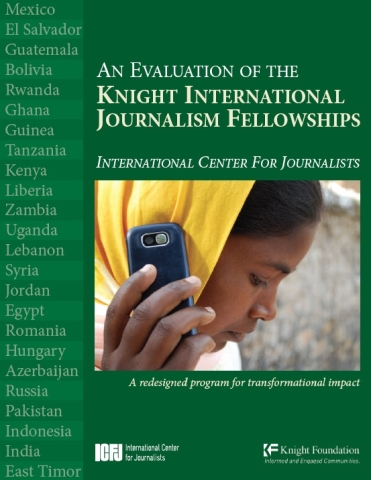
Over time, we’ve noticed a growing myth about media grant making – that the outcomes aren’t quantifiable, that it doesn’t produce a tangible, measurable impact.
In a new report, the International Center for Journalists offers 20 plus reasons to the contrary. That’s how many changes to government policies were brought to bear by the work of fellows. For example,
-
In Kenya, a series on shoddy care in public hospitals resulted in $7.5 million to improve care
-
In Indonesia, a series on medical waste prompted the government to order hospitals to build their own wastewater treatment facilities; and
-
In Peru, after crimes by unlicensed cab drivers were exposed, taxis were required to show official identification
How did 19 fellows accomplish so much in such a short time? ICFJ made major changes to its flagship program, the Knight International Journalism Fellows. The center extended the fellowships to at least a year, recruited international fellows and targeted developing countries where the opportunity for impact was greatest.
Along the way, we also made some important discoveries about what works:
-
Strong journalism skills are not enough to ensure a fellow’s success. The most effective fellows are entrepreneurs with solid management skills needed to lead complex projects in difficult environments.
-
High-impact projects need a strong commitment from local partners. We need to get buy-in, not just from top management at our partner organizations, but also from those working most closely with the fellow. By putting their own resources into the project, local partners have a stake in its success.
-
Projects are more likely to be successful in stable countries with a relatively high level of media freedom.
-
Projects focusing on digital journalism are more likely to produce lasting impact. Mobile phones reach many more people in developing countries than other media. Authoritarian regimes tend to regulate traditional media more than the Internet.
-
Fellows have greater success the longer they are in the field. But we ask only the strongest fellows to extend.
-
Language fluency is essential for success. Previous experience working in a country is not.
-
Innovations developed by Knight fellows can be replicated in other ICFJ programs.
By sharing this report, we hope that others in the field can learn from it – and that they too will share their best practices and lessons learned.
You can also click here to watch a video about the Knight International Journalism Fellowships' impact worldwide.
Eric Newton, senior adviser to the president, the John S. and James L. Knight Foundation and Joyce Barnathan, president, ICFJ